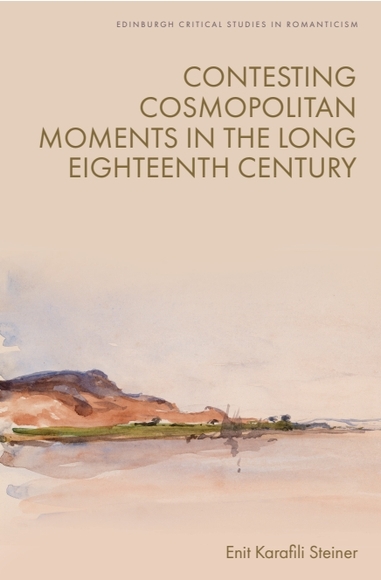
by Enit K Steiner

Contesting Cosmopolitan Moments in the Long Eighteenth Century examines literary manifestations of eighteenth-century cosmopolitanism to reveal cosmopolitanism’s relevance for postcoloniality
What sparked your interest in cosmopolitan studies?
What ignited the spark almost twenty years ago was a doctoral seminar at the University of California Los Angeles, when Professor Anne K Mellor spoke about embodied cosmopolitans in Romantic literature. The attribute “embodied” stuck with me, because it brought the ideas I associated with cosmopolitanism into “the company of flesh and blood”, as Wordsworth’s expression goes. Then years later, I learned in Daniel Richter’s book on the cosmopolis of Classical Athens that, from its inception, teachers of cosmopolitanism (Zeno, Chrysippus) actively opposed the discrimination of foreigners in Athens by maintaining every person’s belonging to the world-wide human community. The figure of the kosmopolites responded to specific xenophobic circumstances, and this was what I needed to build on that first attraction to the cosmopolitan as a habitus of embodied thinking and living.
Was there a question that you encountered frequently during your research?
A question that came up in different iterations conveyed something like a distrust towards cosmopolitanism. Why write about cosmopolitan rather than, say, transnational moments? The more I studied the literary and political climate of the eighteenth-century, the more my conviction grew that cosmopolitanism, whether acknowledged or not, performed a cultural and emancipatory labour that transnationalism, internationalism or multiculturalism could not. Unlike these other isms, it asked for and aspired to more than transactional pragmatism. And it did so because it was grounded in an ever-evolving Classical tradition, which implicitly or explicitly shaped eighteenth-century philosophies, for example, Scottish moral sense philosophy, and religious sensibilities such as those of the Quakers, who spearheaded abolitionist activism. A key argument of my book is that during the many upheavals and imperial endeavours of the long eighteenth century – the 7 Years War, the American, French, and Haitian Revolution, and Napoleon’s assault on Europe – there was a heightened literary engagement with this Classical tradition. And this engagement led to modifications of key cosmopolitan tenets that bestow depth and longevity upon aspirations and practices of inclusivity that are with us today. This is what the book hopes to demonstrate by linking eighteenth-century with postcolonial thought.
How did you select the core texts for each chapter?
The selection was challenging. A great many texts worked well thematically. I decided to be guided by the principle of inclusivity and the literariness of the texts. Literariness in connection to interpretative frames that are rooted in cosmopolitan philosophy seemed an aspect in need of attention in eighteenth-century literary criticism. I eventually chose Goldsmith’s Citizen of the World because it performs syncretic literariness and extends cosmopolitan considerations to animal rights; and Wollstonecraft’s Letters Written in Sweden, Norway and Denmark for offering an alternative to Kant’s state-regulated cosmopolitanism and for exceeding the gender boundaries of Classical cosmopolitan epistolarity; then a set of texts, mostly by Quakers, that draw on Stoic psycho-pedagogy in order to further solidary friendship between white children and enslaved persons. The chapter discussing the travelogue of Abu Taleb Khan, an Indian Persian Muslim scholar, offers the opportunity to approach the cosmopolitan dissemination of knowledge as a vocation; whereas the last chapter on Shelley’s The Last Man unpacks the novel’s meditation on the trope of the translatio studii et imperii in ways that look forward to decolonial thought.
Was there any insight or line of argument that surprised you?
I was surprised to find agreement between Goldsmith’s Chinese protagonist and the philosopher and ecofeminist Val Plumwood’s approach to animal rights and normative vegetarianism. Both are reluctant to impose the vegetarian imperative indiscriminately and universally even on communities whose religious identity and very livelihood depend on animal use and hunting. Another moment of surprise was when Abu Taleb cites the proverb “We are not to abandon the whole, because we cannot obtain the whole”, which echoes Epictetus’s resolution not to cease striving to live like citizens of the world merely because we can never achieve the complete fulfillment of this vocation.
How would you describe a citizen of the world in a nutshell?
I’d rely on Goldsmith’s comparison. Citizens of the world are embedded in real locations and events; they resemble “rivers whose streams are not only increased but refined, as they travel from their source.”
Are you working on a new project?
Yes, on a project that continues my research in literary abolitionist activism in the long-eighteenth century. I’m drawn to the figure of the “living automaton” and am researching it in a variety of genres that seem to promise new insights about the functions of imaginative literature in social engagement.
About the author

Enit Karafili Steiner is a Senior Lecturer at the University of Lausanne, Switzerland. She is the editor of Cosmopolitan Endeavours (2020), and author of Northanger Abbey/Persuasion: Readers’ Guide to Essential Criticism (2016) and Jane Austen’s Civilized Women: Morality, Gender and the Civilizing Process (2012). She has also edited Called to Civil Existence: Dialogues on Mary Wollstonecraft’s A Vindication of the Rights of Woman (2014) and Frances Brooke’s The History of Lady Julia Mandeville (2013).





